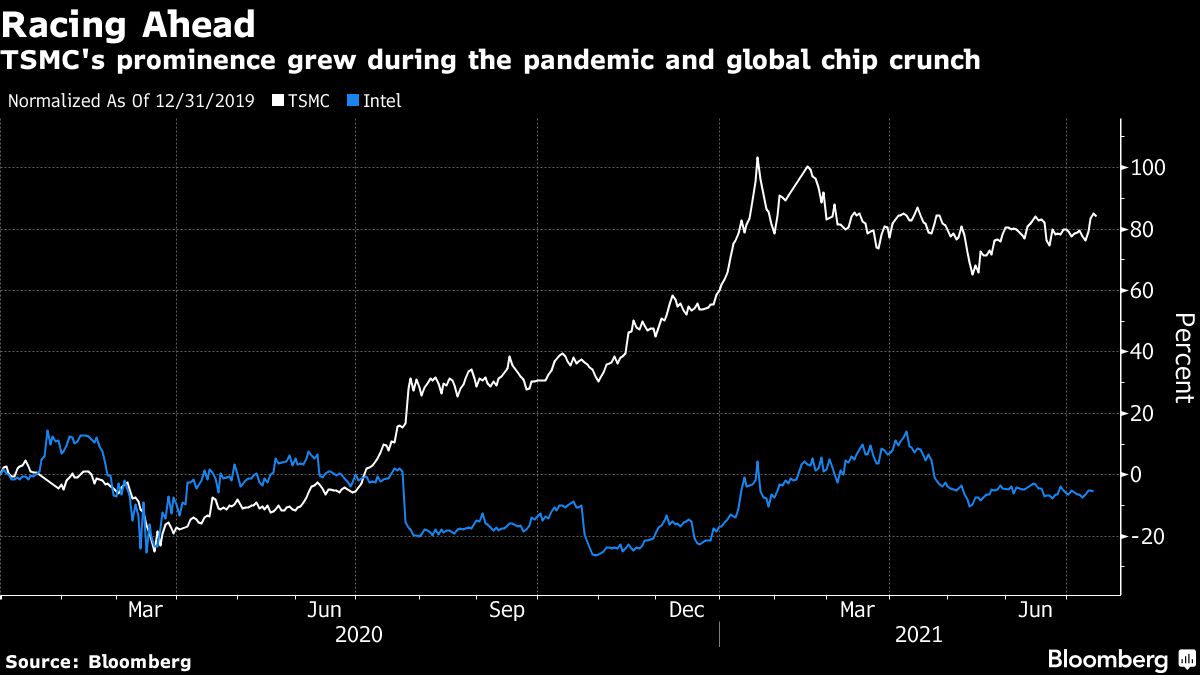TSMC Boosts 2021 Sales Outlook, Affirming Strong Chip Demand

(Bloomberg) — Taiwan Semiconductor Manufacturing Co. expects sales to rise more than 20% in 2021, affirming its crucial role in helping alleviate a global chip shortage that’s walloped automaking and other industries.
TSMC, chipmaker to Apple Inc. and a key partner to many of the world’s biggest carmakers, expects semiconductor supply to remain tight into 2022, Chief Executive Officer C.C. Wei said Thursday. The company will ramp up production of microcontrollers by close to 60% this year, which will help to greatly reduce the chip shortage for its automobile clients starting in the current quarter, executives said.
Revenue in the current quarter may rise to between $14.6 billion and $14.9 billion, in line with the $14.7 billion average of analyst estimates. TSMC’s 2021 sales outlook marked a slight increase from a previous forecast for 20% growth in full-year sales.
“TSMC has actively taken steps throughout the first half of this year and will continue to do so through the rest of the year to address the chip supply challenges” for automakers, Wei told analysts. “We have worked dynamically with other customers to reallocate our wafer capacity to support the worldwide automotive industry.”
While an ongoing semiconductor shortage has hampered the global economic recovery from Covid-19, suppliers like TSMC, the world’s largest contract chipmaker, are among beneficiaries as they race to fulfill orders. The Taiwanese company is also likely to get a lift from plans by Apple Inc., its largest customer, to ready 90 million units of upgraded iPhones for the second half of this year. Capacity will remain tight through the end of the year and extend into 2022, Wei said.
Click here for a liveblog on TSMC’s earnings call.
Net income for the quarter ended in June rose 11%, though profits came in slightly below analyst estimates.
In early July, Daimler AG and Jaguar Land Rover warned that sales will be further curtailed by the persistent chip shortage, with the latter saying deliveries in the second quarter will be 50% worse than initially thought. The U.K. economy’s growth slowed to 0.8% in May, partly due to a 16.4% slump in the production of transport equipment triggered by a lack of semiconductors.
Revenue from automotive clients increased 12% from the first quarter, while high-performance computing climbed by a similar magnitude. Sales to smartphone clients, the biggest chunk of its revenue, eased 3% in the seasonally slower second quarter.
“As TSMC will likely keep loading its capacity at extremely high utilization in upcoming quarters, we expect the strong revenue momentum to continue through end of 2021,” Citigroup analyst Roland Shu wrote in a note last week. “Strong demand but limited capacity increases in the supply chain will continue to allow TSMC to best utilize its capacities and further strengthen its pricing power.”
Gross margin for the second quarter was 50%, below the roughly 51% average predicted by analysts, in part because of gains in the Taiwan dollar during the period. For the September quarter, TSMC forecast gross margin of 49.5% to 51.5%. Analysts had seen 51.5%, according to estimates compiled by Bloomberg.
Meanwhile, in early June, a cluster of Covid-19 infections at a factory in central Taiwan forced King Yuan Electronics Co., one of the world’s leading chip-testing service providers, to shut operations temporarily. That led to minor disruptions in the Taiwanese semiconductor supply chain which many around the world rely on. TSMC said on Monday three of its employees were confirmed to have been infected, though it doesn’t see any impact on operations.
(Updates with full-year, 3Q forecasts starting in first paragraph)
More stories like this are available on bloomberg.com
Subscribe now to stay ahead with the most trusted business news source.
©2021 Bloomberg L.P.




